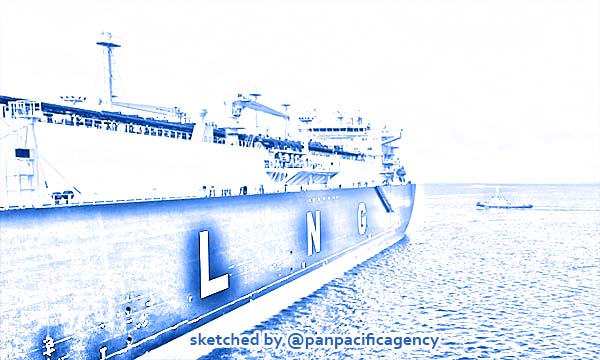[Analytics] Deepening Japan’s cooperation with Papua New Guinea

Under the country's gas industry development plan by 2025, with vision to 2035, Vietnam plans to have six LNG terminals. Photo by Shutterstock. Sketched by the Pan Pacific Agency.
A small but telling glimpse of Japan’s diplomatic approach in Papua New Guinea (PNG) was the soundtrack as world leaders gathered in Port Moresby in 2018 for the APEC leaders’ summit. The ability of the PNG Defence Force band to trumpet national anthems through the tropical heat was in no small part thanks to Japan which has been supporting the band since 2014 with training and instruments through its aid program. Shane McLeod specially for the East Asia Forum.
It is an example of the low-profile but strategic support that the world’s third-largest economy is known for in its relationship with PNG.
Japan may be set to take a much more prominent role in PNG’s political and economic future as it pledges to help the country’s economy recovery from the coronavirus pandemic — with speculation that it may be central to a mooted IMF-managed bailout of the country’s government finances.
Japan’s presence in PNG since its independence is often understated. Japan is a generous development partner and regularly ranks as PNG’s third-largest bilateral aid donor. It is known for delivering aid projects with a focus on quality infrastructure. Recent examples include funding an upgrade of Port Moresby’s dilapidated sewerage treatment capability, improvements to electrical transmission networks in the Ramu grid that serves the industrial city of Lae, as well as the coming upgrade of that city’s airport to international standard.
Japanese companies are critical investors in PNG’s economy. They have been foundation investors in oil and gas projects including the massive PNG LNG project. Japan is also a major customer for the country’s resource outputs including oil, gas and copper. LNG supplies from PNG are reported to account for up to 5 per cent of Japan’s imports. There are also Japanese interests in PNG’s fisheries resources, and in non-pandemic times Japan is one of the largest sources of tourist visitors to PNG.
Japan’s relationship with PNG is built on a complicated history. During the Second World War, Japan’s military occupied much of the country. More than 200,000 Japanese soldiers died during the fighting and the remains of many lie in unmarked graves. There are Papua New Guineans today with memories of the occupation, like founding prime minister Sir Michael Somare who learnt to speak Japanese at elementary school in the 1940s.
Moving from its role as a generous donor to taking the lead in a financial bailout is a significant step for Japan. It would align Japan with the efforts of its allies in the region — particularly Australia and the United States — to reshape their approach to the Pacific in light of the growing role of China in the region.
To date, the most significant example of this is the PNG Electrification Partnership, an agreement signed on the sidelines of the 2018 APEC summit. Japan’s then prime minister Shinzo Abe joined leaders from Australia, New Zealand and the United States to pledge support for PNG’s goal of lifting its electricity supply to 70 per cent of the country by 2030.
Like Australia with its new Australian Infrastructure Financing Facility for the Pacific, Japan appears to be looking for ways to strengthen its reputation as a partner of choice for countries in the Pacific. While previously it might have used its dominant role in the multilateral Asian Development Bank to do things like budget support, talk of a direct loan suggests a new nationally-branded approach to helping PNG.
Australia will likely welcome the presence of another major player. It has already converted what was supposed to be a short-term financing facility into a longer-term loan. Australia’s prominent role as PNG’s largest aid donor — and a multitude of complex bilateral interests from asylum seekers, trade, cross-border crime and health issues — can colour its efforts to take on more.
For Japan, stepping up to help in the Pacific also helps its goal of becoming a ‘normal’ country — one which wields international political influence to match its economic might.
When Japan’s Foreign Minister Toshimitsu Motegi visited Port Moresby in August 2020 as part of a series of visits around Southeast Asia, he pledged to help PNG deal with the economic consequences of COVID-19. Despite speculation of an announcement about Japanese funding for PNG’s budget challenges, the outcome was more benign — a statement of intent to further promote bilateral relations.
Whether a deal eventuates will not be clear for some time. PNG Treasurer Ian Ling-Stuckey outlined the scale of the challenge in parliament in September 2020 and said talks about financing will hopefully be resolved by the end of the year. The mooted IMF package is already generating political controversy, with former prime minister Peter O’Neill leading the criticism.
Japan could quickly find itself central to unpopular debates about currency devaluation, spending priorities and reform of financially troubled state-owned enterprises that are centres of political patronage.
Successfully negotiating that maelstrom will require deft engagement in the day-to-day affairs of PNG politics, with all its volatility, personalities and unpredictability — and a preparedness for tough talk and potential unpopularity.
It is a place where Japan has until now been largely invisible. So, in thinking about stepping in, its leaders must be certain they know what they are in for. PNG’s economic and fiscal challenges are large and it needs outside help to start dealing with them. If Japan is prepared for the complexities that will come, it can be a powerful force in PNG.
Shane McLeod is a research fellow for the Pacific Islands Program at the Lowy Institute, Sydney.